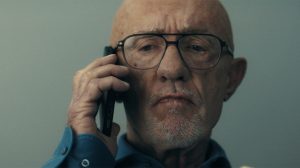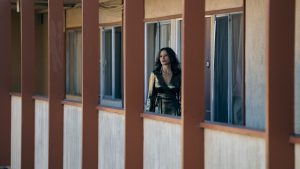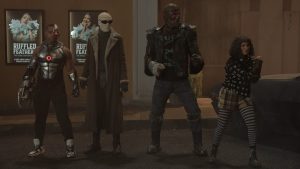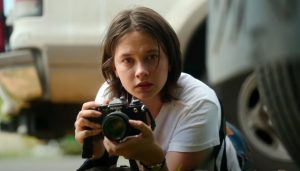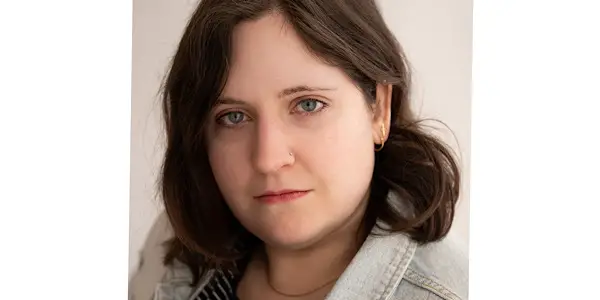
The Coroner’s Assistant, a beloved project from writer/director Angeline Walsh, is a uniquely funny and wonderful foray. There is a fun tone that doesn’t shy away from the macabre. In other words: my kind of story.
I was able to speak with the talented Walsh about her quest to see her dream come to fruition, her process and crew and much more!
This interview has been edited for clarity.
This is Kristy Strouse with Film Inquiry. Congratulations on your nomination and the show. I’d really love to know about the origin story of this, this web series. So if you wouldn’t mind taking us a little down memory lane.
Angeline Walsh: Okay, the whole thing started because I made a short feature back in 2016, called A Murder Party. And there was a character in that film called the coroner’s assistant, which was played by Columbus-based actor Cedric Gegel. And because we were so time-strapped, we had to cut a lot of his scenes. And I was really disappointed in that, because he was one of my favorite characters. So about a year later, I had this idea to make a short film based on the character of the coroner’s assistant. And I told Cedric about it, he was totally into it. So I started writing it in January of 2017, and as soon as I started writing it, I realized that this was more than just a short film, it was going to be a series. And that’s really how that all began, in just sort of a spin-off of a character from a little film I made back in 2016.
So, that character just wouldn’t let you go! Do you feel like it kind of becomes its own thing, you just kind of let the character speak for themselves?
Angeline Walsh: Yeah! I don’t really outline, I have a basic idea. And I’ll just start writing. And really, I’ll let the characters kind of do their own thing. And then once I have sort of a draft, then I use that as an outline for the next draft. But when I’m first drafting, I’d really just sort of go off of a line of dialogue or scene. And then everything sort of takes place from there. When I started writing, the first episode of The Coroner’s Assistant, I only had two characters in mind, which was the coroner’s assistant, James Rigby, and the coroner, Oliver Cross. And then from that, when I started writing, all the other characters sort of popped in. And that was that.
So this was a project that you’ve been thinking about since 2017? Can you talk us a little bit about your process? How it evolved?
Angeline Walsh: Um, I always kind of knew I want to make it, so I knew I was going to have like, a really, really tight budget. So for the first season, I had to make it very contained. While I was writing it, I knew it was going to have to take place in only a few locations. You kind of need the story to be very simple. So, it didn’t really evolve much when I was writing it just because I knew it was going to have to stay very contained. But then, when I was done writing the first season, I had no idea what was going to come next while I was making the whole thing and then I started getting ideas for how I wanted the series to continue. From there, I sort of used the first season as a launching point to write more, which obviously hasn’t been made yet. I used A Murder Party as a springboard for the Coroner’s Assistant, and then the first season is a springboard for a potential second season.
You directed and wrote it, and it is a period piece, do you think that made it more challenging?
Angeline Walsh: I do think making anything on a budget is challenging. Whether or not it’s a period piece or it takes place in modern day. But I do think, you know, that there’s a reason why it took, four, five years, pretty much from start to finish, to make this on a budget we had to fundraise, we had to take our time doing it, because we just didn’t have enough money and resources all at once. We had to do it all in pieces. It took five years to make. I think being able to pool resources is really important in any project and we definitely had to do that with this one. Aimee Morgan, who’s our costumer, she reached out to me because she saw a local ad that I put out in a performing arts forum for a Victorian policeman’s uniform and she had one and then she asked if we wanted a costumer, and of course, I said yes, because we didn’t have one at that point. For locations I visited the Northeast Ohio Historical Society and I asked about different house museums, and I sort of spent a few months going around and looking at all these historical homes and asking around and seeing what really fit the the series best. We had such a tight budget and we had a small crew. I was essentially the location scout, the production designer and everything else.
So, suffice to say you wore many hats. [laughs]
Angeline Walsh: Yeah!
I think it’s very inspiring. It was five years, there’s plenty of opportunity to get discouraged, but it sounds like you stuck with it, and it paid off. So congrats again!
Angeline Walsh: Thank you. Yeah. I am stubborn!
source: Angeline Productions
That can be a good thing! Especially with something like this. So, I’ve seen that your crew was primarily female?
Angeline Walsh: So, all the creative leadership roles were women. There was me, and then my executive producer, Georgiana Lascu and then the director of photography, Dagna Griffin, and we’re all really close. We’re like, sisters. So that was really awesome. Not only were we all women, but we really got along creatively and it was very collaborative. So there wasn’t any guessing games and there wasn’t any competition. We all worked together to achieve the same goals. So that was really nice. A lot of the assistant cameras were women as well.
I love that. And so it’s kind of like a family.
Angeline Walsh: Yes! I know, that’s usually a red flag. I’m hoping that when they talk about indie film, they’re like, “We’re all family here.” and it’s like “Oh, great, that means that it’s going to be super manipulative” or whatever. But in this case when you work very long hours on set with people over the course of five years, you have to get close.
I think it makes perfect sense and the show is a lot of fun. I’m always up for a dark comedy. Was there anything that inspired you that you kind of look to when writing and directing?
Angeline Walsh: Yes, so a big one for me was The Demon Barber of Fleet Street, the film version by Tim Burton. Just Tim Burton films in general, especially when writing this and the first season I really was inspired by this sort of Victorian Penny Dreadful crime drama, very melodramatic sort of feel. That’s really what I wanted it to be like, especially having a lower budget, I knew that would be pretty doable. Because back in the Victorian era the sort of crime, newspaper stories were very over the top. I knew I could do that and I knew my cast could do that as well. That’s the feel I was going for, and just in general films that have a sort of dark aesthetic to it. I think stylistically even …A Series of Unfortunate Events, the 2004 film, and very campy over-the-top stylistic comedy dramas were my main inspiration, aesthetically.
That’s amazing, and love Tim Burton as well. Just curious, what’s your favorite Tim Burton?
Angeline Walsh: He has a lot of films that I really love that are some of my favorites. One of my favorites is probably Ed Wood, which is a film that not a lot of people know about. But that was one of the movies that I saw that really solidified my love of filmmaking. Also, I love Big Fish too.
Fantastic movies! Were there any films or shows you saw growing up that made you say “I want to be a writer?”
Angeline Walsh: When I was a kid, as soon as I learned how to read and write, I was writing stories. It was just very natural to me. Then I would start writing scripts, or plays but I didn’t know what I was writing. Then when I got older, I realized that those were screenplays, even though I didn’t know the format of a screenplay. I would just start writing what I called movies in my head. And write out little scenes on paper, and they didn’t go anywhere. I didn’t finish any of them. I was like, “I’m gonna write a movie.” And I would start writing little scenes, little plays, and force my cousins to act in them and put them on for the family. When I was a little kid, there wasn’t anything that made me think yes, I’m going to be a filmmaker. I think I just always wanted to tell stories, whether that was writing fiction or writing scripts.
I think that’s a wonderful thing, this idea of just always being a storyteller in some capacity. And so, you are nominated for writing for an Astra Award, which is a huge deal. Congratulations! And among some really, heavy hitters with distinguished shows and writers. What was that like getting that news?
Angeline Walsh: Well, it was very weird. To see my name listed amongst people like Amy Sherman-Palladino, and especially her because I think she’s such a well-known TV writer, and I’ve seen so many of the things she’s written. It was just, it was really weird. At first, I was like, “Am I–Is this a prank? Like, joking?” I just thought it was really funny. The idea of my name being listed up there and people kind of seeing it and being like, “Who’s that?”
Yeah, I imagine it would be surreal! The show is coming right up, I wish you the best of luck! What advice would you give to others contemplating making their own film/series?
Angeline Walsh: My number one advice is just to do it, just go for it, because you have nothing to lose. I mean, if you want to make something, pool your resources together and make it even if you think you’re quote-unquote, “not capable.” You’re the one who’s probably best equipped to tell the story that you’re writing. So just go for it. I’ve said before, a lot of writers, don’t see themselves as directors or any sort of leaders. But I think that if you are an independent filmmaker or an independent writer, you might as well just try and make it yourself. Put yourself in a producer’s shoes or director’s shoes, instead of just waiting around for someone to give you the green light or give you the okay to make your your story, especially if you’re a woman. I didn’t want to shop around my script, and then have it be sold to someone who’s not going to let me maintain creative control over my own story. You know, I knew that I knew my characters the best and my story the best. I wanted to make it the way I wanted to make it with the people I wanted to make it with. That’s some advice I would give to writers who feel unsure just try and make your script, make it a reality.
Yeah, that’s, that’s fantastic advice, actually put all those hats on!
Angeline Walsh: Not gonna be easy, but I think it’s worth it. Absolutely.
You mentioned pooling resources. Do you think that that made a huge difference as well? Leaning on others too?
source: Angeline Productions
Angeline Walsh: A lot of the people who helped me make this were people I’ve met at my film school that I was going to at the time, and, you know, the film school would let me borrow equipment as well, and other people could borrow equipment. So that was how we were able to film a lot of the things with the equipment we needed, we would all just rent from our school. We’re all learning together. We were on the same page because working professionals at the time. So it was nice because I felt like there wasn’t this pressure. We were just having fun and working hard. And I think it made a big difference.
Yeah, working hard and having fun. That is how it should be! So what are you working on now?
Angeline Walsh: I have a feature script that’s in the festival circuit right now. It’s a finalist at a festival. It’s a sort of magical realism story.
Congrats!
Angeline Walsh: Yeah, thank you. And then I’m just working on polishing up the second season of the show, and that’s really where all my focus has been. Because I want it to be the best that it can be. If I can make it, I want it to be ready.
Exciting! I look forward to seeing it. I thank you again, and I hope you have a wonderful rest of the holiday season! Good luck at the awards!
We want to thank Angeline Walsh for speaking with us.
Does content like this matter to you?
Become a Member and support film journalism. Unlock access to all of Film Inquiry`s great articles. Join a community of like-minded readers who are passionate about cinema – get access to our private members Network, give back to independent filmmakers, and more.
